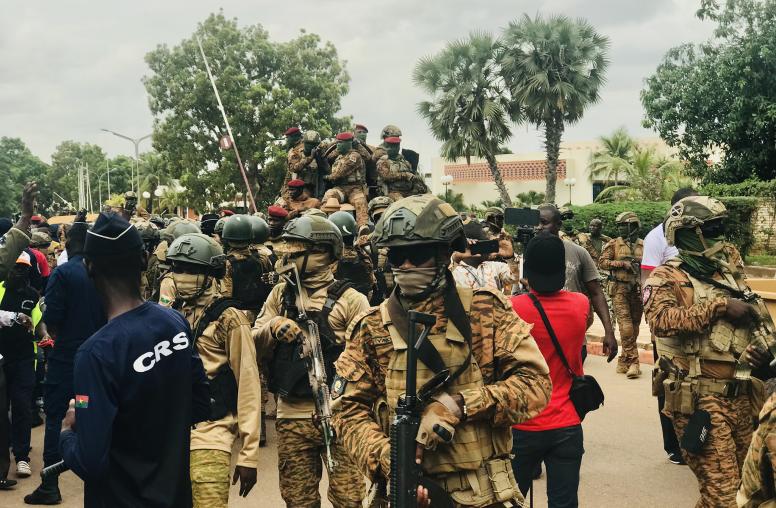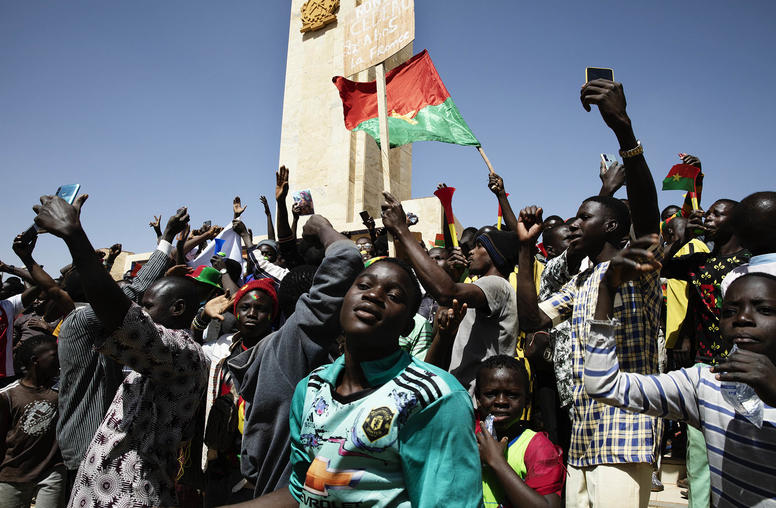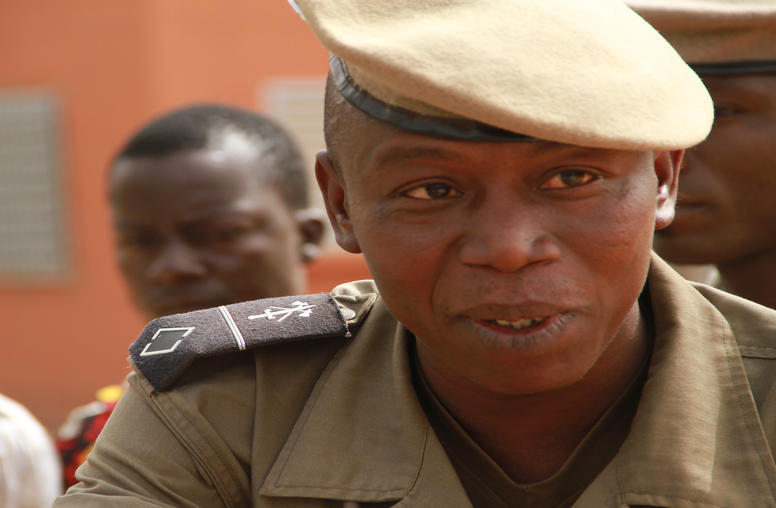Despite Post-Election Violence, Niger Achieves Democratic Breakthrough
Government cracks down on pro-opposition protesters as ruling party candidate is declared winner of presidential contest.
Niger’s presidential election has ushered in the West African nation’s first-ever democratic transition of power. As some international observers have heralded the success of these elections, accusations of irregularities have led to massive protests and government repression, including a 10-day internet shutdown. Hundreds of people have been arrested in the capital, Niamey, while police have clashed with protesters in several other cities. USIP’s Nourdine Harouna Abdou explains what happened in the first- and second-round votes and what the elections mean for peace and security in Niger.

Why was this presidential election so significant?
Niger has never experienced a peaceful democratic transition. Following independence from France in 1960, Niger was governed by a military regime until it transitioned to a democratic form of government in 1991. Since then, it has suffered three successful military coups and has never had a successful transition from one democratically elected government to another.
While some West African presidents, including Alassane Ouattara from Côte d’Ivoire and Alpha Condé from Guinea, engage in democratic drift and seek third terms, Nigerien President Mahamadou Issoufou is notably stepping down after two terms in office. The elections were thus meant to be a decisive turning point in the history of Nigerien democracy — a big step toward the consolidation of democracy. Local and legislative elections were also held without major incident prior to the presidential election.
In addition, Niger has, since 2018, in particular, faced a serious shrinkage of civic space. The government, directed by the ruling party, has arrested civil society activists and journalists, and recently banned demonstrations. There is a systemic movement of repression to silence dissent through blackmail, harassment and imprisonment. The 2019 cybercrime law also includes provisions that will make it easier for the government to restrict expression and speech.
Many political analysts believed that the elections were an opportunity for the people to demand more freedoms and democracy.
What happened in the presidential election?
Like most countries around the world, Niger uses a two-round system for presidential elections. Thirty candidates competed in the first round of the presidential elections held on December 27, 2020. The importance of the election was not lost on Nigeriens. Large numbers of voters, especially women and young people, exercised their right to vote in peace. According to the Independent National Electoral Commission (CENI), voter turnout in the first round on December 27 was 69.67 percent. This exceeded turnouts in the 2016 and 2011 presidential elections — 66.75 percent and 52.83 percent, respectively.
As no single candidate was able to win an absolute majority, a runoff was held on February 21 between the top two vote-getters — Mohamed Bazoum of the Nigerien Party for Democracy and Socialism (PNDS-Tarayya) and Mahamane Ousmane of the Democratic and Republican Renewal (RDR Tchanji) party.
On February 23, the CENI declared Bazoum, the ruling party’s candidate and a former minister of the interior, the winner with 55.75 percent of the vote. Ousmane, who won 44.25 percent of the vote, carried the opposition strongholds of Tillabéry, which includes the capital, Niamey, and Zinder. At the time of this writing, results had not yet been validated by Niger’s constitutional court.
Bazoum is the handpicked successor of outgoing president, Mahamadou Issoufou, who is stepping down after two five-year terms. Issoufou was recently awarded the $5 million Mo Ibrahim prize for his exceptional leadership.
Ousmane, who was the first democratically elected president of Niger in 1991, claims that the election was “marred with a lot of irregularities and fraud.” He declared the election a “hold up.”
There were no major security problems, according to the High Authority for the Fight against Corruption and Similar Infractions. While there were some irregularities in the voting these were not enough to tarnish the credibility of the election, according to national and international observers.
Nevertheless, the opposition claimed electoral fraud and sought the cancellation of the results in some parts of the country. Opposition supporters have also tried to undermine Bazoum’s candidacy by repeating the false claim that Bazoum, a member of a minority Arab ethnic group, is Libyan.
What has happened in Niger since the runoff election?
Despite CENI’s announcement, Ousmane declared himself the winner. His supporters have been protesting in Zinder and Niamey.
The government has cracked down on the protesters and shut down the internet throughout the country for 10 days. Hundreds, including Hama Amadou, an opposition leader and former prime minister, have been arrested. In one notable incident, protesters burned the home of RFI journalist Moussa Kaka.
Niger lost the opportunity to celebrate a peaceful and legitimate democratic transfer of power for the first time in its history.
While the protests in Zinder and Niamey have petered out, there are concerns about more violence. At the same time, Niger’s international partners are now starting to recognize the CENI’s official election results.
What does the election mean for peace and security in Niger?
Like other countries in the Sahel, Niger is facing multiple security crises, including crises linked to violent extremist groups in border regions, particularly Diffa, Tahoua and Tillabéry. To cope with this ever-growing insecurity, Nigerien authorities imposed a state of emergency in the Diffa region in 2015, and in Tillabéry and part of Tahoua in 2017. These states of emergency include curfews and restrictions on movement, which have had a huge impact on the local population’s livelihoods and quality of life. Despite the security situation, Niger managed to hold relatively free and fair elections.
Bazoum ran on a platform of “continuity for a better future,” and all indications are that he will continue Issoufou’s security priorities and policies. Niger spends 15 percent to 20 percent of its annual budget on defense and internal security. We should expect a continued focus on violent extremism, trafficking and migration, in line with the priorities of Niger’s European and North American security partners.
In the immediate term, the potential for violence and division as a consequence of the contested election, protests and government repression all continue to pose a security threat. In the longer term, the greater concerns are the erosion of Nigeriens’ confidence in the electoral process and democratic governance in general, and the even more concerning erosion of nascent democratic norms in Niger.
Nourdine Harouna Abdou is USIP’s Justice and Security Dialogue country officer in Niger.
Malgré la violence post-électorale, le Niger réalise une percée démocratique
Le gouvernement sévit contre les manifestants pro-opposition alors que le candidat du parti au pouvoir est déclaré vainqueur du scrutin présidentiel.
L’élection présidentielle au Niger a marqué le début de la toute première transition démocratique du pouvoir de ce pays d’Afrique de l’Ouest. Alors que certains observateurs internationaux ont annoncé le succès de ces élections, des accusations d'irrégularités ont conduit à des manifestations massives et à une répression gouvernementale, y compris une coupure d'Internet de 10 jours. Des centaines de personnes ont été arrêtées dans la capitale, Niamey, tandis que la police s'est affrontée avec des manifestants dans plusieurs autres villes. Nourdine Harouna Abdou, de l’USIP, explique ce qui s’est passé lors des votes du premier et du deuxième tour et ce que les élections signifient pour la paix et la sécurité au Niger.

Pourquoi cette élection présidentielle a-t-elle été si importante ?
Le Niger n'a jamais connu de transition démocratique pacifique. Après l'indépendance de la France en 1960, le Niger a été gouverné par un régime militaire jusqu'à ce qu'il passe à une forme de gouvernement démocratique en 1991. Depuis lors, il a subi trois coups d'État militaires réussis et n'a jamais connu de transition réussie d'un gouvernement démocratiquement élu à un autre.
Alors que certains présidents ouest-africains, dont Alassane Ouattara de Côte d’Ivoire et Alpha Condé de Guinée, se lancent dans la dérive démocratique et cherchent un troisième mandat, le président nigérien Mahamadou Issoufou démissionne notamment après deux mandats. Les élections devaient donc être un tournant décisif dans l'histoire de la démocratie nigérienne – un grand pas vers la consolidation de la démocratie. Des élections locales et législatives se sont également déroulées sans incident majeur avant l'élection présidentielle.
De plus, le Niger est notamment confronté depuis 2018 à un rétrécissement important de l'espace civique. Le gouvernement, dirigé par le parti au pouvoir, a arrêté des militants de la société civile et des journalistes, et a récemment interdit les manifestations. Il y a un mouvement systémique de répression pour faire taire la dissidence par le chantage, le harcèlement et l'emprisonnement. La loi de 2019 sur la cybercriminalité comprend également des dispositions qui permettront au gouvernement de restreindre plus facilement l'expression et la parole.
De nombreux analystes politiques ont estimé que les élections étaient l'occasion pour le peuple d'exiger davantage de libertés et de démocratie.
Que s'est-il passé lors de l'élection présidentielle ?
Comme la plupart des pays du monde, le Niger utilise un système à deux tours pour les élections présidentielles. Trente candidats se sont disputés au premier tour de l'élection présidentielle du 27 décembre 2020. L'importance de l'élection n'a pas été perdue pour les Nigériens. Un grand nombre d'électeurs, en particulier des femmes et des jeunes, ont exercé leur droit de vote en paix. Selon la Commission électorale nationale indépendante (CENI), le taux de participation au premier tour le 27 décembre était de 69,67%. Cela a dépassé le taux de participation aux élections présidentielles de 2016 et 2011 – 66,75% et 52,83%, respectivement.
Aucun candidat n'ayant pu remporter la majorité absolue, un second tour a eu lieu le 21 février entre les deux premiers électeurs – Mohamed Bazoum du Parti nigérien pour la démocratie et le socialisme (PNDS-Tarayya) et Mahamane Ousmane du Parti du Rassemblement démocratique et républicain (RDR Tchanji).
Le 23 février, la CENI a déclaré Bazoum, candidat du parti au pouvoir et ancien ministre de l’intérieur, vainqueur avec 55,75% des voix. Ousmane, qui a remporté 44,25% des voix, a emporté les bastions de l'opposition de Tillabéry, Y comprend la capitale, Niamey, et Zinder. Au moment de la rédaction de cet article, les résultats n’avaient pas encore été validés par la Cour constitutionnelle du Niger.
Bazoum est le successeur sélectionné du président sortant, Mahamadou Issoufou, qui décide de quitter le fauteuil au terme de ses deux mandats de cinq ans. Issoufou a récemment reçu le prix Mo Ibrahim de 5 millions de dollars pour son leadership exceptionnel.
Ousmane, qui a été le premier président démocratiquement élu du Niger en 1991, affirme que l'élection a été « entachée de nombreuses irrégularités et fraudes ». Il a déclaré que l'élection était un « hold up ».
Il n'y a pas eu de problèmes de sécurité majeurs, selon la Haute Autorité de lutte contre la corruption et les infractions assimilées. Bien qu'il y ait eu quelques irrégularités dans le vote, celles-ci n'ont pas suffi à ternir la crédibilité de l'élection, selon les observateurs nationaux et internationaux.
Néanmoins, l'opposition a fait état de fraude électorale et a demandé l'annulation des résultats dans certaines régions du pays. Les partisans de l’opposition ont également tenté de saper la candidature de Bazoum en répétant la fausse affirmation selon laquelle Bazoum, membre d’une minorité ethnique arabe, est libyen.
Que s'est-il passé au Niger depuis le second tour des élections ?
Malgré l’annonce de la CENI, Ousmane s’est déclaré vainqueur. Ses partisans ont manifesté à Zinder et Niamey.
Le gouvernement a réprimé les manifestants et a coupé Internet dans tout le pays pendant 10 jours. Des centaines des personnes, dont Hama Amadou, chef de l'opposition et ancien Premier ministre, ont été arrêtés. Lors d'un incident notable, des manifestants ont incendié la maison du journaliste de RFI, Moussa Kaka.
Le Niger a perdu l'occasion de célébrer un transfert démocratique pacifique du pouvoir pour la première fois de son histoire.
Tandis que les manifestations à Zinder et Niamey ont cessé, il y a des inquiétudes quant à une augmentation de la violence. Dans le même temps, les partenaires internationaux du Niger commencent à reconnaître les résultats officiels des élections de la CENI.
Que signifie l'élection pour la paix et la sécurité au Niger ?
Comme d'autres pays du Sahel, le Niger est confronté à de multiples crises sécuritaires, notamment des crises liées à des groupes extrémistes violents dans les régions frontalières, en particulier Diffa, Tahoua et Tillabéry. Pour faire face à cette insécurité toujours croissante, les autorités nigériennes ont imposé l'état d'urgence dans la région de Diffa en 2015, et à Tillabéry et une partie de Tahoua en 2017. Ces états d'urgence comprennent des couvre-feux et des restrictions de circulation, qui ont eu un impact énorme sur les moyens d'existence et la qualité de vie de la population locale. Malgré la situation sécuritaire, le Niger a réussi à organiser des élections relativement libres et équitables.
Bazoum a travaillé sur une plate-forme de « continuité pour un avenir meilleur », et tout indique qu’il poursuivra les priorités et les politiques de sécurité d’Issoufou. Le Niger consacre 15 à 20% de son budget annuel à la défense et à la sécurité intérieure. Nous devons nous attendre à une concentration continue sur l’extrémisme violent, la traite et la migration, conformément aux priorités des partenaires de sécurité européens et nord-américains du Niger.
Dans l'immédiat, le potentiel de violence et de division résultant des élections contestées, des manifestations et de la répression gouvernementale continue de constituer une menace pour la sécurité. À plus long terme, les plus grandes préoccupations sont l’érosion de la confiance des Nigériens dans le processus électoral et la gouvernance démocratique en général, et l’érosion encore plus préoccupante des normes démocratiques naissantes au Niger.
Nourdine Harouna Abdou est le responsable national du Dialogue sur la justice et la sécurité de l’USIP au Niger.




